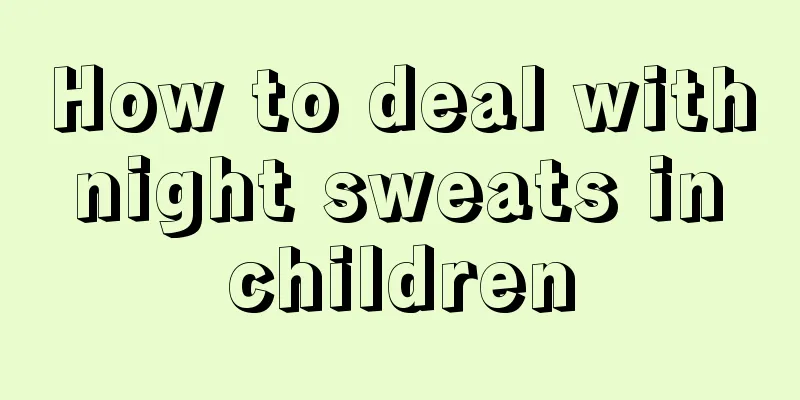The baby has not grown teeth for ten months

|
Xiao Wang and Xiao Li have been good friends since childhood. They got married at the same time and even had children on similar dates. Before marriage, the two women talked a lot about travel, food, and beauty. After marriage, they shifted all their attention to parenting. Xiao Wang's son is only eight months old and has already grown two white and tender canine teeth, while Xiao Li's son is already ten months old and has no teeth yet. So Xiaoli is very worried that her child is lacking calcium? Is it normal for a baby to not have teeth at ten months old? Why is my baby still not growing teeth at nearly ten months old? It is normal for babies to start growing teeth before ten months old. However, if your baby is already ten months old and still has no teeth, I suggest you take your baby to see a doctor in time. It is also best to measure trace elements to see if there is calcium deficiency. Reasons why babies have slow teething 1. Congenital heredity: The main reason why young children grow teeth slowly is genetics, including family medical history, race, and even gender differences. According to most research reports, girls' teeth grow earlier than boys. 2. Acquired environment: In addition to congenital genetic factors, the acquired environment may also indirectly cause slow tooth growth. Take premature babies for example. The time of their teeth growth must be deducted from the time of their premature birth, so that the conclusion drawn can be more accurate. If the baby is born prematurely at 30 weeks of gestational age, the growth of the first tooth must be delayed by 10 weeks (usually 6 to 8 months after birth). In addition, babies who are born with low birth weight are also likely to have slow teething. 3. Systemic diseases: Down syndrome, abnormal pituitary secretion, ectodermal dysplasia syndrome, etc. may all cause differences in the speed of tooth growth in young children. Blood tests must be conducted to determine the true cause. 4. Trauma and infection: If a child's deciduous teeth are uneven, it is very likely that the teeth have been hit by external force, causing the ligaments connected to the teeth to necrotize and be replaced by new bone (bone adhesion). From the outside, it seems that only one tooth is growing slower, but in fact it will affect the eruption of permanent teeth. If a child loses their deciduous teeth prematurely, connective tissue will form on the gum surface. If the permanent teeth have not fully grown at this time, they will be compressed and the permanent teeth will erupt more slowly. In addition, sometimes the medications that young children take can cause the gums to thicken, making it difficult for teeth to erupt, which can also give parents the misconception that teeth are growing more slowly. It is important to remind everyone that the teething cycles of young children are not the same. Although the first tooth should grow at about 6 months of age, for deciduous teeth, a time difference of less than half a year is normal, and the reasonable time difference for permanent teeth can even be extended to 1 year. Therefore, there is generally no need to worry too much. Usually it is just the difference in the speed of tooth growth, which will not affect the function of the teeth. What to do if your baby has a fever while teething A few days before the eruption of deciduous teeth, children may show some abnormal behaviors, such as crying, increased salivation, biting fingers and hard objects, poor sleep, loss of appetite, etc. Some may also have low fever, mild diarrhea, and local gums may be congested and swollen. Generally speaking, the above phenomenon lasts for 3 to 4 days, and the deciduous teeth will break through the gums and erupt. Some children may have late teething, but this does not mean there is anything wrong with their body. Newly erupted deciduous teeth cannot be used for eating, so children should not be given hard food, and mothers should not let children sleep with the nipple in their mouths. The normal basal body temperature of children is 36.9℃~37.5℃. Generally, when the body temperature exceeds the basal body temperature by more than 1°C, it is considered a fever. Among them, low fever refers to body temperature fluctuating around 38°C, and high fever refers to body temperature above 39°C. Continuous fever for more than two weeks is called long-term fever. The above-mentioned basal body temperature refers to the rectal temperature, which is measured from the anus. Generally, the oral temperature is 0.3℃~0.5℃ lower than it, and the armpit and neck temperature is 0.3℃~0.5℃ lower than the oral temperature. If your baby's temperature is 38.1 degrees when measured from the anus, it is considered a low fever. If it is measured from the neck or armpit, the rectal temperature is about 38.7 degrees to 39.1 degrees, which is considered a high fever. My personal principle is that if the temperature is below 38.5 degrees, do not take antipyretics or antipyretic injections, and let the baby drink more water. Pay attention to whether the ambient temperature is too high. In the hot summer, the temperature is very high and the baby's ability to regulate its own body temperature is poor. When the mother holds the baby, the heat is not easy to dissipate, causing the body temperature to rise. However, this kind of fever usually does not last too long. Put the child in a cool place, fan him slightly, give him some cool fruit juice, or give him a warm bath, and the body temperature will return to normal after a few hours. In winter, if the indoor temperature is too high and the baby is wrapped too much, the baby's body temperature will also rise. |
<<: What to do if the baby refuses to eat milk when teething
Recommend
What to do if your newborn is breathing heavily
Many careful parents may have observed that their...
What should I do if my baby cries and holds his breath?
I became a mother a few months ago. As a first-ti...
Boys' height retardation
It is easy to see how a child's physical deve...
What are the growth and development standards for children?
As the baby grows older, he or she will be more w...
Causes of bloating in children
Speaking of abdominal bloating, it is a very comm...
Causes of vaginitis in children
In the eyes of many people, vaginitis only occurs...
Is it good for children to eat pears when they have a fever?
Children will catch a cold from time to time in t...
What should I do if my child has a fever every night?
Everyone knows that children have weaker resistan...
What is the reason for yellow teeth in babies?
What is the reason for the baby's teeth to be...
When is the best time to wean your baby?
When the baby is still in the mother's womb, ...
What to eat when baby has night sweats
Night sweats are very common in children. There a...
What is the height and weight of a 1 year and 3 month old baby?
With a cry, the baby was born. After one year and...
What is persistent diarrhea in children?
Speaking of diarrhea, I believe many people are f...
Can young children eat pomegranates?
Pomegranate is a fruit that tastes sour and can h...
What are the red spots on my daughter's face?
As the saying goes, a daughter is a mother's ...









